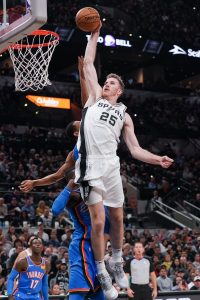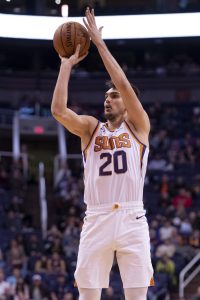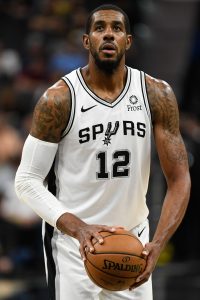The NBA’s rookie scale, which determines how much first-round picks earn during their first four NBA seasons, also dictates how much the qualifying offers will be worth for those players when they reach restricted free agency after year four. However, the value of those qualifying offers can fluctuate depending on whether or not a player has met the “starter criteria.”
A player who is eligible for restricted free agency is considered to have met the starter criteria if he plays at least 2,000 minutes or starts 41 games in the season before he reaches free agency.
A player can also meet the criteria if he averages either of those marks in the two seasons prior to his restricted free agency. For instance, if a player started 50 games in 2018/19 and 32 in 2019/20, he’d meet the starter criteria, since his average number of starts over the last two seasons is 41.
A player’s ability or inability to meet the starter criteria can affect the value of the qualifying offer he receives as a restricted free agent, as follows:
- A top-14 pick who does not meet the starter criteria will receive a qualifying offer equal to the amount the 15th overall pick would receive if he signed for 120% of the rookie scale.
- A player picked between 10th and 30th who meets the criteria will receive a qualifying offer equal to the amount the ninth overall pick would receive if he signed for 120% of the rookie scale.
- A second-round pick or undrafted player who meets the criteria will receive a qualifying offer equal to the amount the 21st overall pick would receive if he signed for 100% of the rookie scale.
- For all other RFAs, the standard criteria determine the amounts of their qualifying offers.
Extending a qualifying offer to a player eligible for restricted free agency officially makes that player an RFA, ensuring that his team has the right of first refusal if he signs an offer sheet with another club. It also gives the player the option of signing that one-year QO.
Generally, the value of a restricted free agent’s qualifying offer isn’t hugely important, since very few RFAs accept those offers outright. There are exceptions though.
In 2017, for instance, both players who signed their one-year QOs – centers Alex Len and Nerlens Noel – failed to meet the starter criteria heading into restricted free agency, reducing the value of their QOs to approximately $4.2MM (from $6.4MM and $5.85MM, respectively). Had Len and Noel met the starter criteria and been eligible for those larger QOs, their free agencies could have played out differently.
Top-14 picks who failed to meet starter criteria:
 With that in mind, let’s check in on how this year’s RFAs-to-be will be impacted by the starter criteria. Listed below are the former top-14 picks on track for restricted free agency who have not met the starter criteria. These players will be eligible for qualifying offers worth $4,642,800.
With that in mind, let’s check in on how this year’s RFAs-to-be will be impacted by the starter criteria. Listed below are the former top-14 picks on track for restricted free agency who have not met the starter criteria. These players will be eligible for qualifying offers worth $4,642,800.
- Jakob Poeltl (Spurs)
- Thon Maker (Pistons)
- Denzel Valentine (Bulls)
As the Nos. 9, 10, and 14 picks in the 2016 draft, Poeltl, Maker, and Valentine won’t be hit particularly hard by falling short of the starter criteria. Their projected qualifying offers would have ranged from approximately $5.09MM to $4.7MM, respectively, so a dip to $4.64MM shouldn’t have a major impact on their respective free agencies. Of the three players, only Poeltl looks like a lock to even receive a QO.
The top-14 pick whose situation remains unclear:
Because of the unusual circumstances surrounding this season, the usual definition of the starter criteria becomes a little more complicated. For instance, if a player started 40 games, but his team’s season ended after 65 games, should he be credited with having met the starter criteria based on the fact that he was “on pace” to do so over a full 82-game season?
There’s only one player who technically didn’t meet the starter criteria but was on pace to do so: Bulls guard Kris Dunn. After starting 44 games in 2018/19, Dunn started 32 of Chicago’s games this year, for a total of 76 over the last two seasons. If his starts this season were prorated over a full 82 games, he would have met the starter criteria.
The NBA and NBPA have agreed to prorate the criteria for performance bonuses and incentives in player contracts — it would make sense for the same rules to apply to Dunn. However, as we discussed last week, the fourth-year guard had a knee injury that was expected to sideline him for the rest of the season before COVID-19 threw the schedule into disarray. The Bulls, who had control over Dunn’s ability to make the last six starts he needed, may push back against the idea that proration should allow him to surpass the starter-criteria threshold.
ESPN’s Bobby Marks tells Hoops Rumors that Dunn will likely be deemed to have met the starter criteria, in which case his qualifying offer will be worth $7,091,457. If that changes, the value of his QO would dip to $4,642,800.
First-round picks between 10-30 who met starter criteria:
Only one player falls into this group this season.
- Dario Saric (Suns)

Because Saric was a 12th overall pick and met the starter criteria with 50 starts this season, he’s eligible for a qualifying offer worth $5,087,871 instead of $4,791,213. No other players fit the bill this year — many of the best players drafted between Nos. 10 and 30 in 2016 have already been extended, while the others didn’t have major roles or are no longer on their rookie contracts.
Entering the season, Malik Beasley – who logged nearly 1,900 minutes in 2018/19 – looked like the strongest candidate to join Saric in this group. However, Beasley had an inconsistent role in the Nuggets’ rotation before being traded to the Timberwolves, and ended up making just 14 starts (all with Minnesota), with 1,209 total minutes played.
Second-round picks and UDFAs who met starter criteria:
No second-round picks or undrafted free agents eligible for restricted free agency met the starter criteria this season, which would have put them in line for a qualifying offer worth $3,126,948.
Actually, Bogdan Bogdanovic (Kings) technically qualified for this group, but because his initial NBA contract was more lucrative than most, his qualifying offer will be worth $10,661,733 based on other criteria, rendering the starter criteria irrelevant for him.
De’Anthony Melton, Kenrich Williams, Torrey Craig, and Jevon Carter were some of the other top candidates to meet the starter criteria among second-rounders and UDFAs, but none ultimately recorded more than 1,011 minutes (Melton) or 18 starts (Williams).
As a result, those players – and the rest of this year’s restricted free agents – won’t have their projected qualifying offers impacted by the starter criteria.
Photos courtesy of USA Today Sports Images. Salary information from Basketball Insiders used in the creation of this post.
